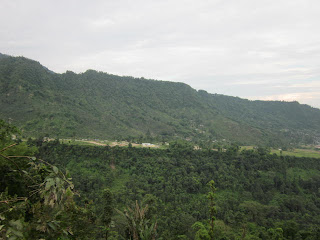Historical Place Dalim Fort
It was said that King
Gaebbo Achyok was so powerful and strong that he was invincible. The history says that the Bhutanese invaded
Gorubathan went on rampage; ransacking properties, food grain, cattles and even
molested ignorant and innocent women and children. King Gaebbo Achyok then fought for his pride,
dignity and most importantly for the freedom of his people. King of Bhutan had
to face defeat. After series of defeat the Bhutanese General Ashyik Doogey sent
his messenger to King Gaebbo Achyok to neutralize warfare and to build up
friendship for the sake of the peace for their respective people. And to sign
the treaty they met in place called Dalim Fort which exits to this day. Bhutanese General had ill-thought for King
Gaebbo Achyok. He wanted to weed out King Gaebbo Achyok from his throne. In
order to do so he made him drink wine thoroughly. When King Gaebbo Achyok was in deep sleep Bhutanese General drew his sword and beheaded king Gaebbo Achyok.
This was how the invincible king Gaebbo Achyok died. The head
and the body of the king Gaebbo Achyok was thrown into the ravine of deep cold water of Chel River and
till date this place is known as Bhootay Daha (Devil’s pond). Lepchas and Bhutanese people
still afraid to go to this river alone even in daylight. Sometime later the
rumour spread out all over Gorubathan
that an old lady who went to near Chel
River to make pigs foods.She saw the body and head of the king Gaebbo
Achyok floating in the river and was about to join. When she reported this to
Bhutanese authority. The Bhutanese authority ordered his soldiers to chop off
the body and the head of the dead king Gaebbo Achyok into pieces and to throw
them to different directions. It was believed that these pieces had turned into
leeches and mosquitoes.




I am from Bhutan and I would like to share to you some stories about Gorobhatan and its neighboring places of Samshing, Kalingpong, Pedong and the Duars.
ReplyDeleteUntil 1865, a fort in Dalingma, adjacent to Gorubhathan was a gate-way frontier to western Bhutan under the Governor-Ponlop of Paro. Dzongpon of Daling Fort administered Bengal Duars and south western territory of Bhutan starting east side of river Teesta that includes Pedong, Kalingpong till Totopara.
Bhutan ceded three of its main southern frontiers of Daling-kha in the west, Buxa fort at Sunkosh Raidak, Dewang giri in the east whose administration stretched till river Dhunsiri near Guhati to Britain in 1865 after the two nations fought the war. Kalimpong was made as the next retreat center for British government after Darjeeling who British have annexed from Sikkim in the early 1800s. After the Anglo-Bhutanese war of 1865 the forts of Daling, Buxa and Dewangiri was crumbled down by the British so that Bhutanese could never come to reclaim its past glory. However British have always acknowledged the territories captured from Bhutan and later when relation became better, British have returned some portions of land in Kalimpong to Bhutan as the resident of the then upper chamberlain to the King of Bhutan, Gongzim Kazi Ugyen Dorji, who was that time the foreign minister and ambassador of Bhutan to Britain. The place is known as Bhutan house and until road network penetrated to Bhutan, that is till 1960s, the southern parts of Bhutan was administered from Bhutan House in Kalimpong by the Gongzim.
Before British left India in 1947, 80 square kilometers of Dewangiri was returned back to Bhutan as a gesture of respect to the King of Bhutan. Just to let you know, that Bhutan was compensated in the form of money by the British for capturing Bhutanese Duars and its administration forts that includes Daling in 1965.
I can say that, territories which I am talking about were Bhutanese at one point of time and people of that area are still Bhutanese.
However we understand that demographic pattern of the population, people and religions were greatly changed after British have converted all the territories captured from Bhutan to tea gardens, where extensive tea gardeners were brought from various parts of India.
One thing that people quickly forget is the history of the place that they live in. I have not seen Darjeeling media houses and tourism officials of West Bengal writing histories and facts of the places.
As a fact, the southern foothills of the Himalayas has Mongoloid settlements as far as 2000 years plus and not known where they originated from. Mentioned by renowned anthropologists.
I hope this small piece of article helps trail history of gorubhatan in case visitors and youngsters wants to know.
Karma Dhendup.
This is one of the territory where Ashley Eden Mission right after the decent from Darjeeling, he stopped by this place waiting for orders to come from the Deb Raja of Bhutan.
ReplyDeleteHe waited here for so many days, at times going up the hills and again return back to the same place.
Can you please explain more about Daling or Dalim Dzong la? When was it constructed and who build that Dzong?
ReplyDeleteI am from Bhutan 🇧🇹 and would like to know more about Daling Dzong....
ReplyDelete